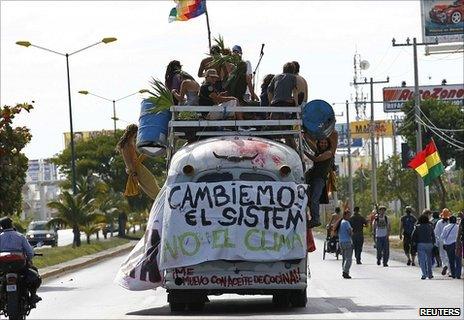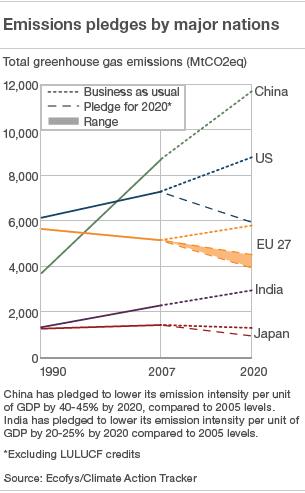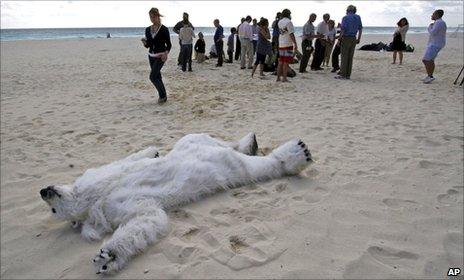Harrabin's Notes: No crash for climate bus
- Published
In his regular column, BBC environment analyst Roger Harrabin looks at what has been achieved at the Cancun climate summit and the goals which remain out of reach.
NO CRASH FOR CLIMATE BUS

The climate bus is back on the road, but will it reach its destination?
Just before a last-minute surge of goodwill seized delegates in Cancun, the UN climate process looked a road crash waiting to happen.
The inevitable brinksmanship that prevails whenever 190 nations try to agree a single path pushed the climate bus to the edge of the abyss.
After last year's crash in Copenhagen this would surely have spelled the end of the current UN attempt to cut emissions blamed for climate change.
But alarmed delegates committed to saving the UN process joined to wrench the wheel and avoid the vehicle smashing over the edge.
What's more, the climate bus wasn't just yanked back on to the road - it was pointed in the right direction, and it's still moving. Trebles all round (except for the driver).
But has the climatariat been seized by collective near-miss euphoria? The sort of unhinging emotion that courses through your veins when you realise you've nearly died?
Because after the conference, some environmentalists were voicing the hope that the climate bus would be heading towards a globally binding agreement on emissions at next year's big climate meeting at Durban in South Africa.
Are we there yet?
Of course, my perspective on this issue may be biased by location - I am writing from the Houston Energy Corridor overlooking an 18-lane highway buzzing with SUVs.

On the other side is a Chevvy showroom and a QuickLube dealer. I'm here to report on the rise of shale gas which is giving the US energy independence and sapping investment from renewables.
I'm reading in the papers about the rise of the climate sceptic Tea Party. And the words of Jonathan Pershing are ringing in my ears.
He's the chief US negotiator, and he told me at the Tianjin climate conference a few months ago that he didn't expect climate or energy laws through the US Congress for maybe four years (assuming that President Obama wins a second term, which is questionable). And that was before Republicans seized control of the House.
Dr Pershing said he believed the US would be able to meet its Copenhagen Accord commitment of a few percent cut off 1990 CO2 levels by 2020.
But senior commentators here doubt that is possible without legislation. And, anyway, it is far distant from what developing countries want, bearing in mind that rich nations have noted that establishment science expects them to cut 25-40% by 2020.
The Americans, blamed by some for undermining talks behind the scenes at Cancun, were eventually cheered when they supported the final Cancun text - but that's only because no one's really counting on them for support.
The fact that the US declared itself out of the Kyoto Protocol so long ago has allowed others to emerge as Kyoto villains.
Japan and Russia, both unwilling to commit to legally binding agreements when the US won't do so and when the current boom in emissions is from emerging nations which are challenging their industries on the world stage.

Activists were keen to remind delegates of the potential consequences of climate change
This is not to deny progress at Cancun. The Mexican hosts produced masterful compromise texts which saw promising though not conclusive deals to transfer technology and protect the world's forests.
Also significant was the deal to gain trust between rich and poor nations by sharing administration of the $100bn climate adaptation fund.
The sum would almost double current aid flows globally. But there was no agreement on how the cash will be provided, and no agreement to assess whether it'll be enough to help poor nations cope (they say it's not).
But these are side-issues. The main purpose of the climate process is to stabilise emissions at a safe level. Scientists also want it to protect the oceans from CO2 acidification.
Study after study shows that the current offers of emissions cuts are way, way off track, supposing that the climate models are right.
And business groups have already said they don't have enough clarity yet about the future direction of climate laws to make the clean energy investments they would need.
At this rate, the climate bus won't make it in time. And no amount of cheering its success in avoiding a fatal accident will change that.